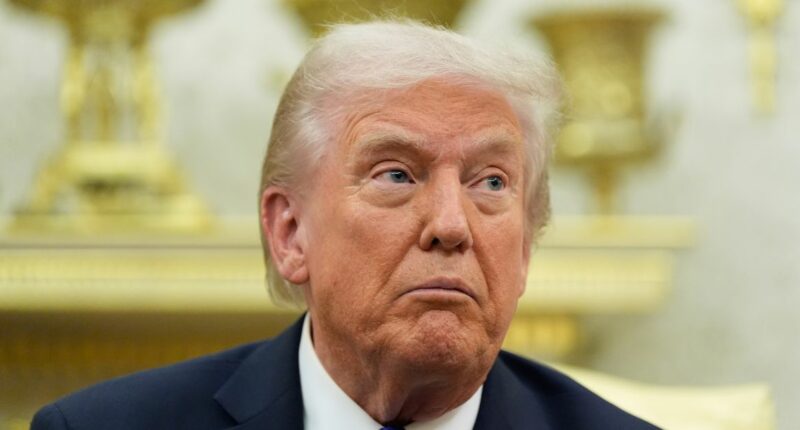Share this @internewscast.com
President Donald Trump listens to a question from a reporter as he meets with NATO Secretary General Mark Rutte in the Oval Office of the White House, Wednesday, Oct. 22, 2025, in Washington (AP Photo/Alex Brandon).
In a significant legal decision, a federal judge in Rhode Island has blocked the Trump administration’s attempt to withhold transportation funding from states that do not comply with federal immigration mandates. This ruling underscores the ongoing tension between state and federal authority over immigration enforcement.
Chief U.S. District Judge John McConnell, appointed by Barack Obama, delivered his verdict with a pointed question: “Can the executive branch use federal transportation funds, amounting to billions, as leverage to enforce state compliance with federal civil immigration policies?” His answer was a resounding no, marking a blow to the administration’s efforts.
Within a comprehensive 32-page document, Judge McConnell laid out the case’s history and applicable legal precedents. He criticized the Trump administration’s approach, stating, “Defendants have blatantly overstepped their statutory authority, violated the [Administrative Procedure Act], and transgressed well-settled constitutional limitations on federal funding conditions.” McConnell firmly added, “The Constitution demands the Court set aside this lawless behavior.”
The judge also noted that Congress itself could have made federal transportation funding dependent on states’ cooperation with federal immigration enforcement. However, as there was no evidence of such legislative action, McConnell concluded that the Department of Transportation (DOT) was not endowed with the extensive authority it claimed to impose conditions unrelated to its grant programs.
Earlier in April, Transportation Secretary Sean Duffy issued a directive urging states to adhere to federal immigration laws. This so-called “Duffy Directive” was soon reflected in grant agreements through the introduction of the Immigration Enforcement Condition (IEC), which McConnell detailed in his ruling.
In April, Transportation Secretary Sean Duffy issued a warning to states that they must follow federal immigration law. Around the same time as the so-called “Duffy Directive,” the Department of Transportation (DOT) “began adding language to reflect the Duffy Directive’s position into grant agreements” — what has been referred to as the Immigration Enforcement Condition (IEC), as McConnell recounts.
A group of 20 states, including California, Connecticut, and Rhode Island, sued the Trump administration to halt the so-called “Duffy Directive,” and in June, McConnell granted a preliminary injunction, finding that they were “likely to succeed” in their argument that such a condition violates the Administrative Procedure Act (APA) — the federal statute governing the behavior of federal agencies — and the U.S. Constitution.
The Trump administration has argued, among other things, that the IEC was designed “with the stated goal of improving public safety,” suggesting the states are not entitled to federal funds when they plan to violate federal law.
McConnell dismissed this argument, calling it a “gimcrack defense.”
“The Court has disposed of Defendants’ nakedly misleading characterization of what the IEC requires,” he wrote.
The judge declared the IEC unlawful and ordered its language removed from all grant agreements administered by the Department of Transportation. He also prohibited the defendants from “attempting to condition federal transportation funding on State cooperation with federal civil immigration enforcement.”
Connecticut Attorney General William Tong celebrated the ruling.
“Donald Trump tried to condition billions of dollars in transportation funds on a series of irrational immigration demands,” Tong said. “It was dumb and dangerous, and we just beat him again in court. We need safe, functioning highways, railways and airways. That’s one of the most basic functions of government. The fact that Donald Trump would imperil that shows just how little he cares about the safety of American families.”
Law&Crime reached out to the DOT for comment.
















